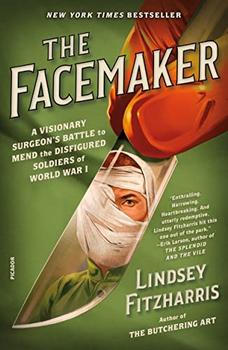Summary | Excerpt | Reviews | Beyond the Book | Readalikes | Genres & Themes | Author Bio

A Visionary Surgeon's Battle to Mend the Disfigured Soldiers of World War I
by Lindsey Fitzharris
As he returned to his seat, he wondered how he would explain his prolonged absence—and the details of the "throat" case—to his young wife. Throughout the rest of the performance, he had trouble concentrating on anything "but the slight lump in the beautiful dancer's costume where my rather rough-and-ready dressing bulged."
It was an incident that Gillies would recount many times in later years, as if removing the pointed end of a pair of scissors from a ballerina's buttock was the crowning glory of his career.
* * *
Felyne Verbist was performing in the very same production of Aida a year later on July 28, 1914, when the Austro-Hungarian Empire declared war on Serbia, signaling the start of the First World War. A week later—as Britons flocked to the beach to enjoy one last bank holiday before the summer officially drew to a close—Britain declared war on Germany, plunging the nation into one of the deadliest conflicts in history. On that sweltering summer day, however, few people could have predicted the calamity that was about to engulf the nation. The outbreak of war came as a complete surprise to most.
The trouble had begun a month earlier. A Serbian nationalist named Gavrilo Princip had shot the Austrian archduke Franz Ferdinand and his wife, Sophie, Duchess of Hohenberg, while they were visiting Sarajevo. The couple had traveled there to inspect the imperial armed forces in Bosnia and Herzegovina, which had been annexed by the Austro-Hungarian Empire in 1908. Princip believed the territories belonged to Serbia and saw an opportunity to retaliate for the annexation by assassinating the presumptive heir to the imperial throne. Supplied with weapons by a Serbian terrorist organization called the Black Hand, Princip and five other conspirators met in Sarajevo with the intention of assassinating the archduke.
Ferdinand was not oblivious to the danger. Three years earlier, the Black Hand had tried to eliminate his uncle, the emperor Franz Josef. And the archduke had allegedly told a family member shortly before he died that he had foreseen his own murder. Nonetheless, Ferdinand must not have been overly concerned for his safety on that particular trip, since he announced his plans to visit Sarajevo two months in advance of traveling—giving any would-be assassins plenty of time to formulate a plan.
In retrospect, it would seem that all the parties involved had a date with destiny.
On the morning of June 28, the royal couple arrived by train. They were in high spirits, as it was their wedding anniversary. Indeed, that was one of the reasons the duchess insisted on being at her husband's side on this official state visit. Their personal chauffeur—a chubby-cheeked, neatly mustachioed man named Leopold Lojka—had accompanied them on their journey. Lojka helped the archduke and duchess into a Gräf & Stift Double Phaeton convertible with a license plate that read A111 118—a spooky coincidence, given that Armistice Day would later fall on 11–11–18.
The luxurious car was the second in a six-vehicle motorcade that was to proceed to the city hall along a tree-lined boulevard known as Appel Quay, which skirted the Miljacka River. The previous day had been cool and rainy, but the sun had broken through the clouds to welcome the royal couple on their visit. Given the glorious weather, the cloth top of the convertible had been folded down to allow people to see the archduke and duchess as they were driven to their destination. Official security precautions were conspicuously absent despite warnings that a terrorist attack was likely.
Armed with semiautomatic pistols and explosives strapped around their waists, the assassins had scattered themselves along the parade route earlier that morning to give themselves the best chance of intercepting the archduke. If one failed, another stood in reserve. In addition to their weapons, they also carried with them paper packets of cyanide powder, in case their plan went awry. It wasn't long before it did.
Excerpted from The Facemaker by Lindsey Fitzharris. Copyright © 2022 by Lindsey Fitzharris. Excerpted by permission of Farrar, Straus & Giroux. All rights reserved. No part of this excerpt may be reproduced or reprinted without permission in writing from the publisher.
Your guide toexceptional books
BookBrowse seeks out and recommends the best in contemporary fiction and nonfiction—books that not only engage and entertain but also deepen our understanding of ourselves and the world around us.